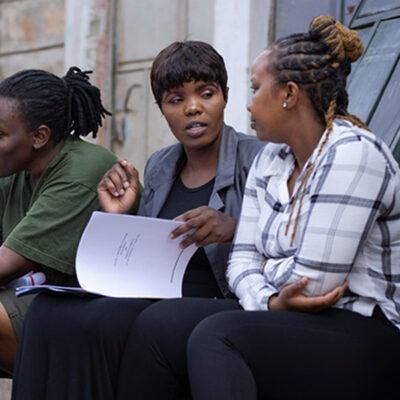In the four painful years of the Trump presidency, the advocates AJWS supports around the world have mourned the United States’ greatly diminished role as a force of justice and progress on the global stage. But since Joe Biden won the 2020 election, they have grown cautiously optimistic that we could soon see a U.S. government committed to turning back the tide of xenophobia and discrimination that have plagued the past four years.
U.S. foreign policy decisions can have drastic, immediate consequences for the social change organizations that AJWS supports. The draconian global gag rule, for example, denies U.S. global funding to any organization providing legal, safe abortion services or referrals — and was strengthened under the Trump administration. The Biden/Harris victory makes many activists and advocates AJWS supports increasingly hopeful that our country will fight for the rights of oppressed and vulnerable people around the world.
As we anticipate a vastly different type of leadership under President Biden, we asked AJWS advocacy and social change groups around the world: What do you want to see from the new administration?
Act in Courageous Solidarity
Amal de Chickera, of the Institute for Statelessness and Inclusion, sums up the hopes of our grantee organizations around the world:
“My call would be for the pursuit of a different type of politics and foreign policy: one not based on fear or xenophobia, but rather one which goes down a much more courageous path of taking responsibility, showing generosity, acting in solidarity and welcoming outsiders.”
Reestablish the U.S. as a Human Rights Leader
Akila Radhakrishnan is President of the Global Justice Center, an advocacy group of feminist lawyers enforcing international laws that protect human rights. She hopes that the new administration will, “work to repair the harm caused by policies like the global gag rule and authorizing sanctions on human rights protectors, such as the prosecutor of the International Criminal Court,” she says. Akila is referring to the ICC’s Fatou Bensouda, who was unjustly sanctioned by the U.S. government in 2020 following the court’s investigation of possible war crimes committed by U.S. forces in Afghanistan.
Akila believes that the U.S. must rejoin the Human Rights Council and the World Health Organization, and change how it fights for human rights — both internationally and here at home. “The United States has seen itself as an agent and caretaker of international human rights and international law, but not a subject,” she says. Indeed, we’ll need to hold our own country accountable to the same laws and principals to which we hold every other country around the world.
Build Respect for Indigenous Communities
From Mexico to Burma and everywhere in between, our grantee-partners fighting for Indigenous rights have high hopes that the incoming Biden administration will end the racist and violence-inciting rhetoric of President Trump. Our grantee-partner Centro de Derechos Humanos de la Montaña Tlachinollan, which advocates on behalf of Indigenous communities in Mexico, has watched in horror as the outgoing administration has vilified the thousands of migrants who have journeyed to the U.S.’s southern border. Tlachinollan hopes for a new era: “Respect for the rights of migrants will bring peace on the borders and the foundations will be established so as not to criminalize the poor or persecute the most defenseless. ”
Demand Equal Rights for Women, Girls & LGBTQI+ People
The outgoing administration repeatedly undermined the rights and health of women and girls — particularly reproductive rights — often under the guise of protecting religious freedom. Akila Radhakrishnan noted the importance of repealing the global gag rule, which denies funding to clinics and organizations that provide or counsel about abortion — even if they provide an array of other life-saving health services to the community.
But repealing the global gag rule is insufficient, says Akila. The Biden-Harris administration must, “clearly communicate its repeal, including the human rights-based reasons for repealing, and prioritize the funding of sexual and reproductive rights with U.S. foreign assistance funds.” There should be no question whether the U.S. supports every person’s rights to health services.
Bring Justice for Genocide
In the past four years, we’ve seen a rise in violence and discrimination against oppressed people. In 2017, for example, the Burmese government carried out a genocide against the Rohingya people, an ethnic and religious minority. The violence forced hundreds of thousands to flee to Bangladesh. But despite international censure, the outgoing administration remained silent as thousands of Rohingya were tortured, terrorized and murdered.
AJWS partner Tun Khin, Director of the Burmese Rohingya Organisation UK (BROUK), says that Biden’s vow to fight for justice gives him confidence: “We hope Biden’s government will follow through with actions, including: sanctions on military companies, naming the genocide what it is and following through on accountability.”
Amal adds, “The U.S. has a responsibility here… to place the nationality rights, safe and secure return, restitution and accountability for the Rohingya, at the center of its relations with Myanmar.”
Overall, human rights defenders around the world have reason to hope for a brighter future, but our work together — to hold our leaders accountable to build that future — is just beginning.
As Amal says, “This victory only marks the start of a long journey towards what can be possible…The hard work that must be put in from now on must have a much higher and deeper ambition: to build stronger and better.”





